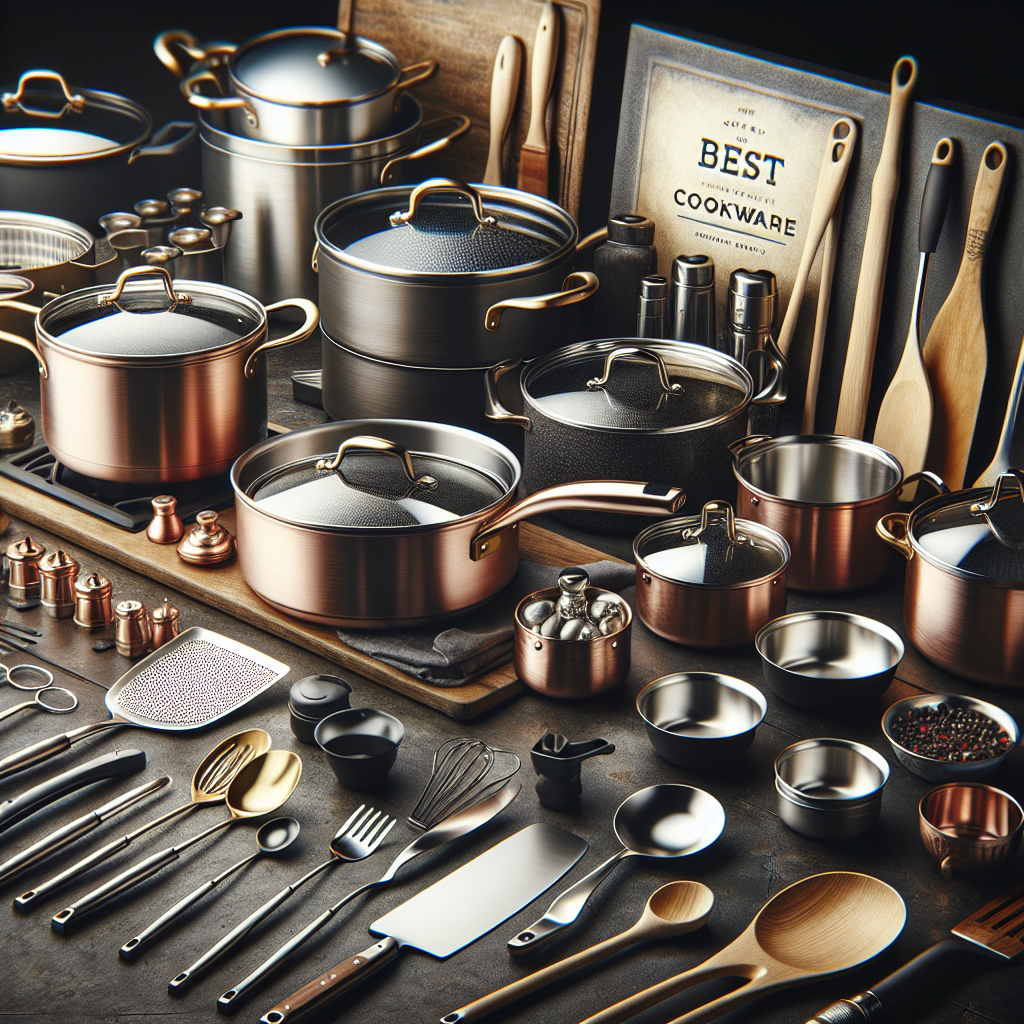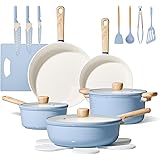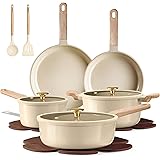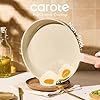Some suggestions to consider!
Astercook Non Stick RV Pots and Pans Ceramic Kitchen Cookware Set with Detachable/Removable Handle, Oven Safe, Induction Ready, Stackable, Black, 21 pcs
$59.99 (as of February 25, 2026 10:30 GMT +00:00 - More infoProduct prices and availability are accurate as of the date/time indicated and are subject to change. Any price and availability information displayed on [relevant Amazon Site(s), as applicable] at the time of purchase will apply to the purchase of this product.)CAROTE 24pcs Ceramic Cookware Set, Pots and Pans Non Stick Kitchen Cookware Sets, Pots and Pans Set Cooking Set with Knife Set
$59.98 (as of February 25, 2026 10:30 GMT +00:00 - More infoProduct prices and availability are accurate as of the date/time indicated and are subject to change. Any price and availability information displayed on [relevant Amazon Site(s), as applicable] at the time of purchase will apply to the purchase of this product.)CAROTE 14Pcs Pots and Pans Set Non stick, Ceramic Cookware Set, Non-toxic Kitchen Cooking Set, PFAS and PFOA Free
30% Off
Essential Cookware for Every Kitchen
Understanding Cookware Basics
When I first started cooking, I had no idea what types of cookware I really needed. I picked up a random assortment of pans, and you could say it was a hot mess! Over time, I learned that understanding the basics of cookware is essential. There are various materials like stainless steel, cast iron, and non-stick, and each serves a different purpose.
For instance, stainless steel is durable and ideal for browning meats and stir-frying, while non-stick pans are perfect for cooking eggs and delicate foods. Cast iron, on the other hand, retains heat exceptionally well and is great for sautéing and baking. Knowing what each type does really helped me streamline my cooking experience.
So, the first step in selecting your cookware is to consider how you cook. Are you a fan of high-heat searing, or do you prefer low-and-slow braising? Understanding your cooking style will help you make informed choices!
Cookware Sets vs. Individual Pieces
One thing I learned the hard way was the difference between buying a complete set versus individual pieces. Initially, I jumped at the idea of a massive set—it seemed like such a great deal! But let me tell you, not all pieces are created equal. Some were downright useless for my cooking style.
Individual pieces, on the other hand, allow you to curate your collection according to your needs. If you often make stir-fries, investing in a good wok can be a game changer. I started picking one quality piece at a time, and it was like upgrading my whole cooking game!
So, think about your kitchen goals. Do you want the flexibility of choosing individual pieces, or do you prefer the simplicity of a set? Either way, focus on quality to make sure your cookware stands the test of time.
Must-Have Cookware Essentials
For me, a few specific pieces have become absolute staples in my kitchen. If you want to set yourself up for culinary success, here are the essentials I can’t live without: a high-quality chef’s knife, a sturdy cutting board, a non-stick skillet, a heavy-bottomed pot, and a cast iron skillet.
The chef’s knife is your best friend for chopping and dicing. Don’t skimp on this; a good knife makes cooking so much easier. The non-stick skillet is fantastic for weekend brunches, and the heavy-bottomed pot is a must for soups and stocks.
Lastly, a cast iron skillet is versatile—it’s great for searing meat and can go from stovetop to oven with ease. Build your kitchen from these essential foundations, and you’ll find that cooking becomes a joyful journey.
Choosing the Right Materials
Benefits of Different Cookware Materials
When I began exploring cookware, I found myself overwhelmed by the variety of materials available. Each type has its own pros and cons, which can affect everything from heat distribution to how easy they are to clean.
For example, stainless steel is fantastic for durability and resistance to rust and warping. On the other hand, non-stick surfaces are a blessing for easy cleanup but require a gentle touch to avoid scratches. Understanding these differences has empowered me to choose the right tools for each dish.
And let’s not forget about ceramic, which although beautiful, can be a bit fragile. You shouldn’t be throwing these around the kitchen, for sure! So, take some time to learn about materials to ensure that what you’re buying fits your cooking style and lifestyle.
Understanding Heat Conductivity
Another lesson from my experience is understanding heat conductivity. Trust me, poor heat distribution can ruin your meal before you even get started! Cast iron holds heat like a champ, so if you’re looking for a crispy crust on meats, this is your go-to.
Conversely, if you’re new to cooking and not ready to dive into cast iron, stainless steel does an awesome job as well. It heats quickly and responds well to temperature adjustments. Start experimenting with various pans to see how they impact your cooking!
Ultimately, knowing how each material reacts to heat will help you achieve the best results, whether you’re a novice or a seasoned pro.
Care and Maintenance of Your Cookware
Taking care of your cookware is as important as choosing it. I learned this the hard way when I accidentally ruined a beloved non-stick skillet by using metal utensils. Yes, I know, rookie mistake! Proper care will extend the life of your cookware.
Always read care instructions specific to your cookware; cast iron, for instance, needs to be seasoned, while most stainless steel can just go in the dishwasher. If you take the time to clean and care for your tools, they will serve you well for years to come.
Also, consider how you store your cookware. Stack them carefully and use pan protectors if necessary to avoid scratching. These little steps can make a world of difference in keeping your kitchen running smoothly.
Investing Wisely in Quality Cookware
Understanding Value Over Price
One thing I’ve picked up over time is the importance of focusing on value rather than just price. It’s tempting to go for the cheap options, but they often fall apart or don’t perform as well. Instead, I’ve started investing in a few quality pieces that have lasted me years.
For instance, opting for a more expensive chef’s knife was a revelation. It made a noticeable difference in my prep work, saving time and effort. You really do get what you pay for when it comes to cookware.
So, take some time to research reputable brands that offer durable products. Quality tools can elevate your cooking game and save you from frequent replacements in the long run.
Building a Cookware Collection Over Time
If you’re feeling overwhelmed or unsure about what to invest in first, don’t fret! Building a solid cookware collection over time is not only smart but also budget-friendly. You don’t need to buy everything at once.
I started with one or two pieces I knew I’d use often. From there, I expanded my collection as I discovered new cooking interests or techniques. You’ll find that with time, your kitchen will reflect your cooking style and personality.
Take this journey at your own pace. Cooking should be fun, not stressful, and building your collection gradually allows you to appreciate each piece you choose!
Shopping Tips for Smart Cookware Purchases
In closing, let’s talk about shopping tips. I’ve found that knowing where to shop and what to look for can save you a lot of headaches. Check out local kitchen stores where you can feel the products in your hands. There’s something about a pan’s weight and feel that tells you a lot.
Don’t hesitate to check out reviews or even seek recommendations from friends who love to cook. They can often steer you in the right direction when you’re unsure. And always check for warranties or guarantees—they’re a sign of quality.
Lastly, keep an eye out for seasonal sales or restaurant supply stores for hidden gems. You can score amazing deals on high-quality cookware if you’re savvy!
Frequently Asked Questions
What are the essential cookware pieces I should have?
Some must-have pieces include a chef’s knife, a good cutting board, a non-stick skillet, a heavy pot for soups, and a cast iron skillet. These will give you the versatility to tackle a variety of recipes!
Are expensive cookware options worth it?
Yes! While it might be tempting to go cheap, investing in quality cookware can save you time and money in the long run. Quality pieces often perform better and last much longer.
How do I maintain my cookware properly?
Always read the care instructions specific to each piece. For most, gentle hand washing is best, and avoid metal utensils on non-stick surfaces. Proper care will ensure longevity.
Can I build my cookware collection gradually?
Absolutely! Focus on a few essential pieces to start, and expand your collection as you discover new interests. This way, you won’t overwhelm your budget all at once!
Where should I shop for cookware?
Local kitchen stores are great for hands-on experience, while online reviews can help you compare prices. Keep an eye out for sales and consider restaurant supply stores for high-quality options at lower prices!
Related Content
- How to Create a Minimalist Cookware Set
- How to Clean Stainless Steel Cookware: 7 Effective Tips for 2025
- The Ultimate Guide to 10 Effective Cookware That Heats Evenly in 2025
- Circulon A1 Series Nonstick Cookware Set review
- Master the Art of Cooking: How to Choose High Quality Cookware That Lasts for a Lifetime








